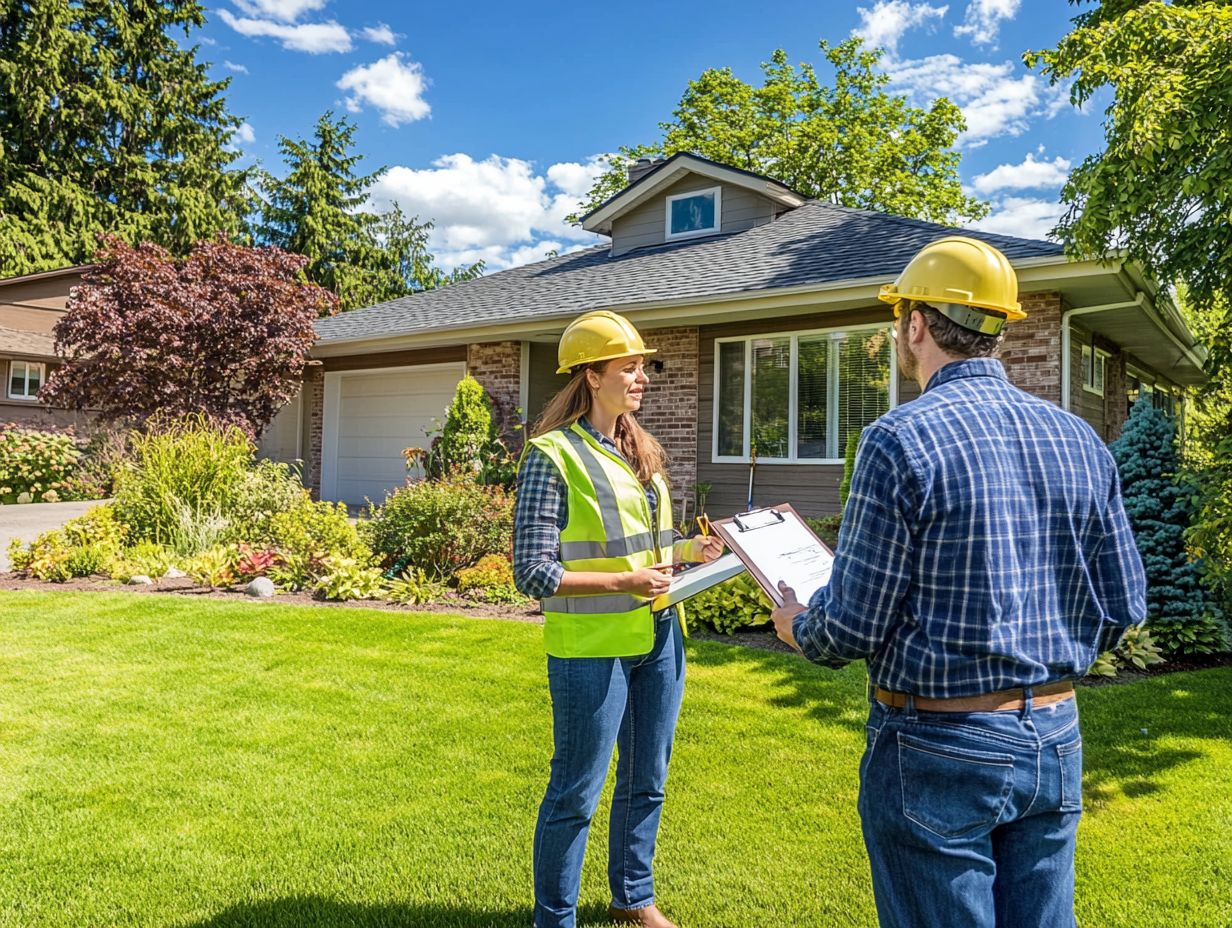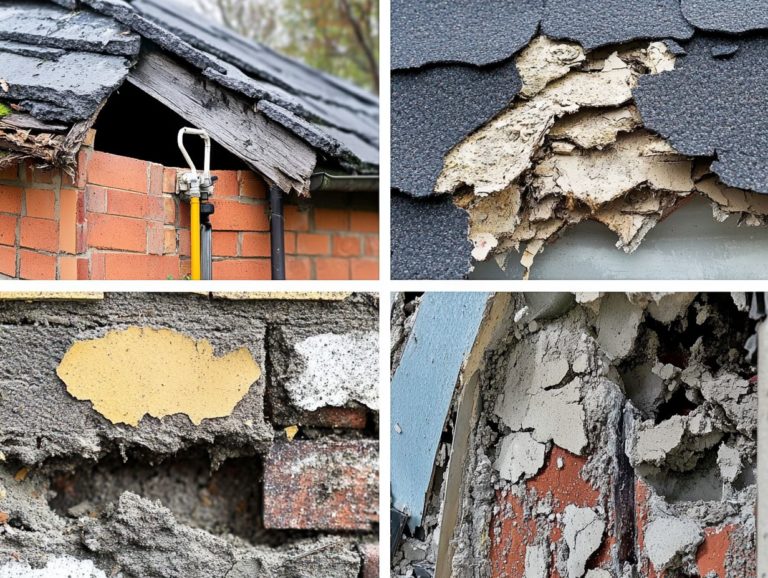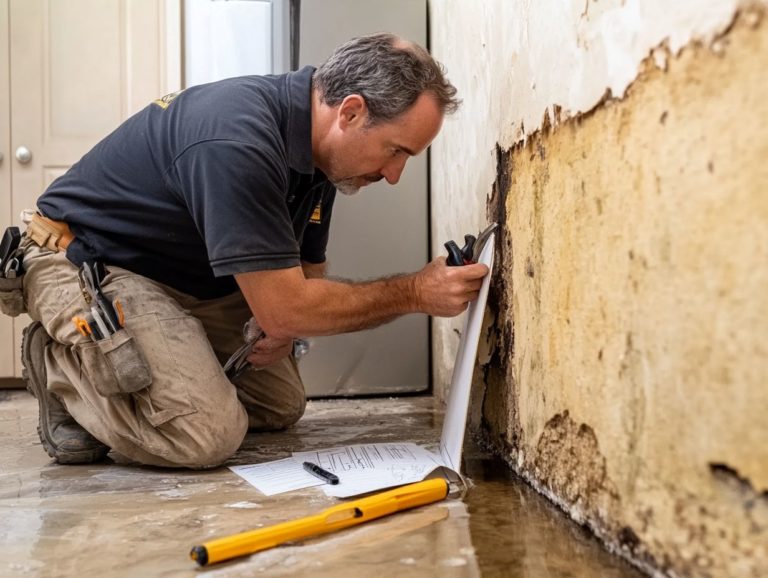Understanding the Role of Home Inspectors
When you re buying or selling a home, knowing the property’s condition is essential. Home inspectors are key in this process, providing insights that help buyers and sellers make informed choices.
This article reveals the importance of home inspections and guides you through the inspection process. You’ll learn what inspectors look for and how to choose a reliable one.
By the end, you’ll understand how to navigate your home inspection with confidence.
Contents
- Key Takeaways:
- What is a Home Inspector?
- Why are Home Inspections Important?
- The Home Inspection Process
- What Do Home Inspectors Look For?
- How to Choose a Reliable Home Inspector
- Home Inspection Reports
- Final Thoughts and Recommendations
- Frequently Asked Questions about Home Inspections
- What is the role of a home inspector?
- Why is it important to understand the role of home inspectors?
- What does a home inspector look for during an inspection?
- What are the qualifications of a home inspector?
- Can a home inspector provide repair estimates?
- What should I do if the home inspector finds issues in the property?
Key Takeaways:

Home inspectors provide a thorough evaluation of a property’s condition. They help buyers and sellers identify issues to make informed decisions.
When choosing a home inspector, consider their qualifications and communication style for a reliable assessment.
What is a Home Inspector?
A home inspector is a trained professional who conducts careful checks of properties. They help you make informed decisions during real estate transactions.
This expert assesses the property’s condition by examining structural integrity, plumbing, electrical systems, and heating, ventilation, and air conditioning (HVAC). Their insights help you navigate your real estate journey with confidence.
Why are Home Inspections Important?
Home inspections are critical for buyers and sellers because they reveal potential issues that could affect market value. This process gives you the power to make informed choices during negotiations.
Addressing concerns before finalizing the sale can prevent buyer’s remorse and ensure necessary repairs are completed for a smoother transaction.
The Home Inspection Process
The home inspection process involves a step-by-step guide that thoroughly examines a property’s condition. Understanding this process ensures that buyers and sellers are aware of inspection requirements.
What Do Home Inspectors Look For?

Home inspectors focus on crucial areas during assessments, including plumbing, electrical systems, HVAC, and potential foundation defects. These aspects are vital for safety and property integrity.
By identifying these common inspection areas, inspectors provide valuable insights regarding necessary repairs.
How to Choose a Reliable Home Inspector
Selecting a dependable home inspector is essential for a thorough property evaluation. Consider their qualifications and inspection training details.
Ask insightful questions to find an objective advisor who can be your ally in the real estate journey.
Home Inspection Reports
Home inspection reports offer a complete evaluation of a property’s condition. They help buyers and sellers understand and use this information effectively during negotiations and for future maintenance.
These reports detail inspection findings and highlight any critical issues discovered during the assessment.
1. Components of a Home Inspection Report
A comprehensive home inspection report includes important parts, such as a summary of the inspection findings and detailed descriptions of any identified issues. It also provides recommendations for repairs or maintenance to ensure the safety of your property.
The report also examines your home’s structural integrity, or how strong and stable your home is, covering crucial elements such as the foundation, roofing, and walls. It addresses the condition of vital systems like plumbing and electrical components, which are critical for the functionality and safety of your space.
Each section is meticulously crafted to provide clarity on potential hazards and necessary improvements, empowering you with the knowledge needed to make informed decisions. By grasping these detailed findings, you can navigate your responsibilities more effectively and prioritize repairs. This ultimately enhances the value of your property.
2. How to Read a Home Inspection Report

Reading a home inspection report is an art that requires you to grasp its layout, terminology, and the importance of the findings. This knowledge empowers you, whether you’re a buyer or seller, to make informed decisions regarding essential repairs and safety compliance.
To effectively navigate the report, start by familiarizing yourself with key sections, such as the overall summary, specific findings, and any recommendations for repairs or improvements. Each comment may use technical terms that describe the condition of various home components, like the roof, plumbing, or electrical systems.
Being able to distinguish between minor issues and major concerns is vital during negotiations. By closely examining the inspector s notes and suggestions, you can prioritize actions that not only enhance safety but also elevate the overall value of your home.
3. Using Inspection Reports for Negotiation
Unlock the full potential of your home inspection report! Home inspection reports can be invaluable tools in your negotiation arsenal, providing concrete evidence of necessary repairs that can significantly sway buyer sentiment and the overall dynamics of the transaction.
To make the most of these reports, approach the negotiation table with a solid understanding of the findings. Presenting the report concisely, with a focus on critical issues like plumbing or electrical flaws, underscores the necessity of repairs and strengthens your case for price adjustments.
When discussing the findings, maintain a calm and factual demeanor. Frame your requests for repairs as reasonable expectations rather than demands. This strategy not only establishes your credibility but also cultivates a collaborative atmosphere that can lead to a more favorable outcome for everyone involved.
Final Thoughts and Recommendations
Final thoughts underscore the importance of engaging a qualified home inspector to ensure a seamless real estate transaction. Their expertise guarantees a thorough property evaluation that benefits both buyers and sellers.
Home inspectors are invaluable in identifying potential issues that could impact the value and safety of a property, providing critical insights for everyone involved. As a buyer, it s essential to choose inspectors with solid credentials, experience, and glowing reviews.
On the flip side, sellers should consider a pre-listing inspection to proactively address any concerns before listing their property. When interpreting the inspection report, it s crucial for both buyers and sellers to focus not only on the issues at hand but also on the recommended solutions.
By maintaining open communication with the inspector, you can navigate negotiations and repairs with greater ease. Prioritizing a comprehensive home inspection is key to achieving a smooth transaction and ensuring long-term satisfaction in homeownership.
Frequently Asked Questions about Home Inspections
You ll often find that frequently asked questions about home inspections center on the roles and responsibilities of a home inspector, the intricacies of the home inspection process, and the ways both buyers and sellers can benefit from these evaluations.
Grasping these common inquiries can significantly demystify the home inspection experience for you. Don t wait until it s too late!
What is the role of a home inspector?
A home inspector evaluates a property s condition. They provide an unbiased report on key aspects like walls, plumbing, and electrical systems.
Why is it important to understand the role of home inspectors?
Understanding the role of home inspectors is crucial. It helps you know what to expect from their services and allows you to ask the right questions when buying or selling a home.
What does a home inspector look for during an inspection?
A home inspector identifies potential issues in a property. They examine the foundation, roof, electrical and plumbing systems, HVAC, and other vital components.
What are the qualifications of a home inspector?
Most states require home inspectors to be licensed and certified. They often have backgrounds in construction or engineering and undergo specialized training.
Can a home inspector provide repair estimates?
Home inspectors can point out issues but typically do not provide repair estimates. For accurate estimates, it s best to consult a contractor.
What should I do if the home inspector finds issues in the property?
If the inspector finds issues, you have important choices to make! You can negotiate with the seller for repairs, request a credit towards future fixes, or consider walking away. Discuss the best course of action with your real estate agent and attorney.






